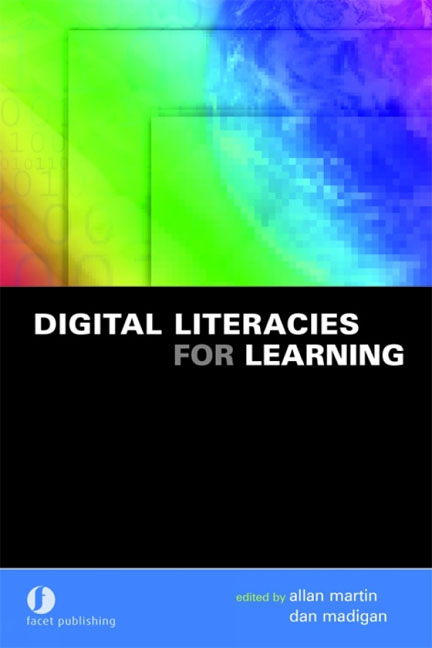Book contents
- Frontmatter
- Contents
- Dedication
- The contributors
- Foreword
- Preface
- Part I Literacies in the digital age
- Part II Enabling and supporting digital literacies
- 12 Supporting and enabling digital literacy in a global environment: preview of Part 2
- 13 A ‘dense symphony of the nation’: Cymru Ar-Lein and e-citizens and e-communities in Wales
- 14 The impact of information competencies on socio-economic development in Southern Hemisphere economies
- 15 Supporting students in e-learning
- 16 The information commons: a student-centred environment for IT and information literacy development
- 17 Socio-cultural approaches to literacy and subject knowledge development in learning management systems
- 18 Approaches to enabling digital literacies: successes and failures
- 19 Professional development and graduate students: approaches to technical and information competence
- 20 Windward in an asynchronous world: the Antiguan initiative, unanticipated pleasure of the distance learning revolution
- 21 A tale of two courses
- Index
12 - Supporting and enabling digital literacy in a global environment: preview of Part 2
from Part II - Enabling and supporting digital literacies
Published online by Cambridge University Press: 08 June 2018
- Frontmatter
- Contents
- Dedication
- The contributors
- Foreword
- Preface
- Part I Literacies in the digital age
- Part II Enabling and supporting digital literacies
- 12 Supporting and enabling digital literacy in a global environment: preview of Part 2
- 13 A ‘dense symphony of the nation’: Cymru Ar-Lein and e-citizens and e-communities in Wales
- 14 The impact of information competencies on socio-economic development in Southern Hemisphere economies
- 15 Supporting students in e-learning
- 16 The information commons: a student-centred environment for IT and information literacy development
- 17 Socio-cultural approaches to literacy and subject knowledge development in learning management systems
- 18 Approaches to enabling digital literacies: successes and failures
- 19 Professional development and graduate students: approaches to technical and information competence
- 20 Windward in an asynchronous world: the Antiguan initiative, unanticipated pleasure of the distance learning revolution
- 21 A tale of two courses
- Index
Summary
Abstract
We have learned in the previous section that our world is becoming increasingly digital and that this is profoundly affecting how we learn and live. Those that do not have access to this digital world, and those who cannot use digital tools to become independent learners and explorers of new ideas, will be at a distinct disadvantage as learners. As the authors in this section describe, and I summarize in this chapter, the educational process for much of the world is being significantly impacted on by digital technologies, and those parts of the world that are not yet there, as many envisage, soon will be. The questions that arise regarding such impact are many. For example, how will our lives change as a result of these new technologies? Who gets access to digital technologies? How are those points of access supported? And how do we as educational leaders transform ways of teaching and learning in traditional settings to accommodate new digitally enhanced learning environments? Within this chapter, readers will be introduced to a section preview of the many practical ways that educators throughout the world are using digital technology to enhance learning and the lives not only of a new generation of learners, but also of those generations who have been swept up in the digital revolution leading up to and into the new millennium.
Introduction
In January 2005, as the authors of this book were writing about enabling digital literacy among the world's populations, Nicholas Negroponte was following suit in his own way. As an MIT scholar, expert on digital technologies, and a leader in a new non-profit initiative, Negroponte was speaking at the World Economic Forum at Davos in Switzerland. His topic was ‘One Laptop per Child’ (OLPC). In his speech, Negroponte remarked that he and his team envisioned a laptop that would allow children from even the poorest countries a ‘window to the world’, and ‘a tool with which to think’. He envisaged a world where achieving literacy in such areas as reading, writing and mathematics were enabled through the digital world of computers, software applications and the internet. Ten months later, the first laptop prototype was revealed to the public in a world press conference. The $100 laptop had been born, reflecting a technology that according to Negroponte could ‘revolutionize how we educate the world's children’.
- Type
- Chapter
- Information
- Digital Literacies for Learning , pp. 135 - 141Publisher: FacetPrint publication year: 2006



